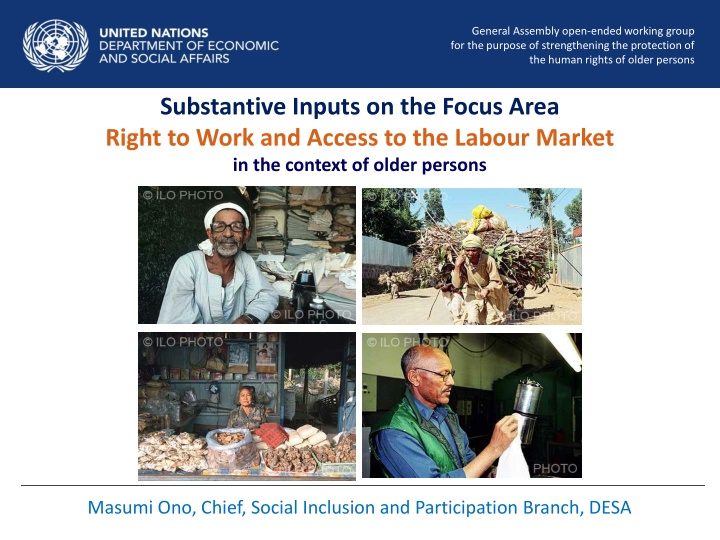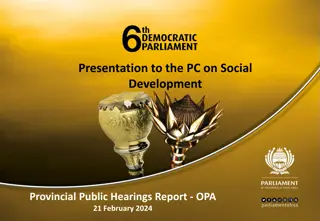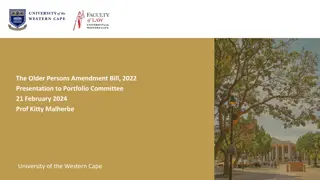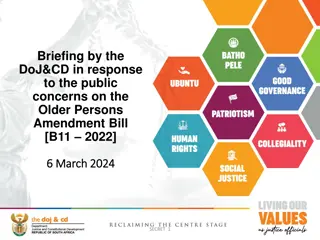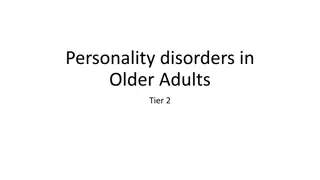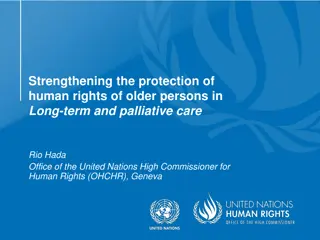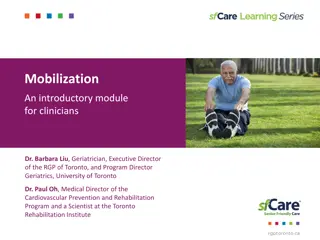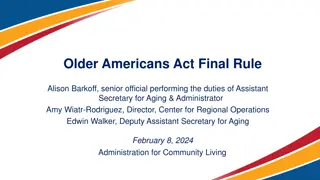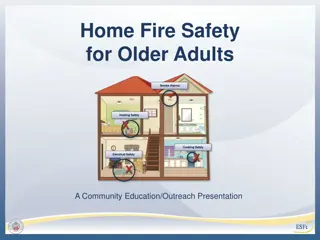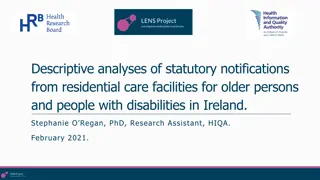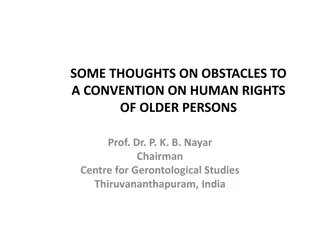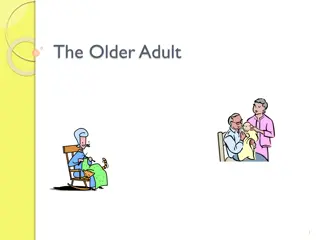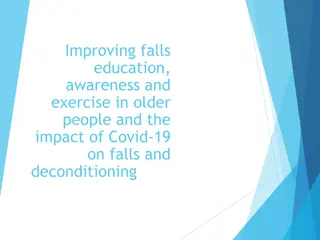Strengthening Older Persons' Right to Work
This content discusses the challenges and key points related to older persons' right to work and access to the labor market. It analyzes national legal and policy frameworks, identifies age-based discrimination issues, employment barriers, and the lack of data on older persons' engagement in the economy.
Uploaded on Apr 12, 2025 | 0 Views
Download Presentation

Please find below an Image/Link to download the presentation.
The content on the website is provided AS IS for your information and personal use only. It may not be sold, licensed, or shared on other websites without obtaining consent from the author.If you encounter any issues during the download, it is possible that the publisher has removed the file from their server.
You are allowed to download the files provided on this website for personal or commercial use, subject to the condition that they are used lawfully. All files are the property of their respective owners.
The content on the website is provided AS IS for your information and personal use only. It may not be sold, licensed, or shared on other websites without obtaining consent from the author.
E N D
Presentation Transcript
General Assembly open-ended working group for the purpose of strengthening the protection of the human rights of older persons Substantive Inputs on the Focus Area Right to Work and Access to the Labour Market in the context of older persons Masumi Ono, Chief, Social Inclusion and Participation Branch, DESA
Working Document submitted by DESA A/AC.278/2021/CRP.3 Available at bit.ly/OEWG11_OlderPersonsRights Background International HR Framework Intro - National legal and Policy Framework - Availability, Accessibility, Acceptability and Quality - Equality and Non-discrimination - Remedies and redress Analysis
Analysis of Submissions: National legal and policy frameworks Legal provisions & policy frameworks recognizing the right to work for all citizens exist in most countries, including: national constitutions labour codes employment acts anti-discrimination legislation laws and national policies on ageing and older persons regulations focused on older persons and employment national development plans applicable regional or international frameworks and bodies
Analysis of Submissions: National legal and policy frameworks Key challenges: Age based discrimination. Discrimination is stronger where other variables such as gender and disability coexist with older age Barriers to employment that push older persons to retire or prevent them from remaining employed Inadequate or inexistent accessibility conditions and work environment adaptions Higher rates of vulnerable and informal employment Lack of access to training Data and research on the engagement of older persons in the informal economy is seldom available. In some countries, available data on informal work is not disaggregated by age and gender or does not include older persons.
Analysis of Submissions: Availability, Accessibility, Acceptability & Quality A range of measures exists to promote the access of older persons to the labor market from dedicated employment systems, to measures aimed at providing training opportunities or workplace accommodations. The availability of specialized services targeted for older workers differs as a result of different policy priorities. Many countries reported on diverse incentives aimed at facilitating their employment and retention. Best practices: adopting age inclusive policies and legal provisions; pension reforms; changes to social protection systems; investments in skills training and development for older adults; improving research and data. Some respondents raised concerns over the adequacy of protection provided to older workers due to barriers in access to justice, such as long court trials and high and unforeseeable trial expenses. Older people engaged in the informal sector remain unprotected under these measures.
Analysis of Submissions: Equality and non-discrimination Submissions often framed non-discrimination of older persons in the right to work and access to the labour market in general clauses of non-discrimination in their legislation that include age as a ground and would apply to all rights, including that of the right to work. Regional frameworks and instruments such as the Inter-American Convention on Protecting the Human Rights of Older Persons and European Union legislation were identified as relevant. Where policies and legislation for older persons exist, discrimination against older persons may be prohibited broadly or, in some cases, specifically with respect to the right to work and access to the labour market. Many inputs showed that, regardless of existing discrimination provisions in national legislation, ageism and ageist stereotypes negatively impact the enjoyment of the right to work and access to labour market by older persons.
Analysis of Submissions: Remedies and Redress Administrative and judicial mechanisms to guarantee citizens obtain reparations when their labour rights are denied exist in some countries. Several States reported the human rights commissions or tribunals established under related legislation as the primary means of redress for older workers. Other submissions highlighted government-funded helplines established to assist people, including older person, with discrimination concerns. High legal costs and lengthy proceedings often discourage litigation by older workers.
Thank you for your attention Follow @UN4Ageing Visit social.un.org/ageing
